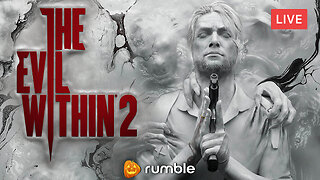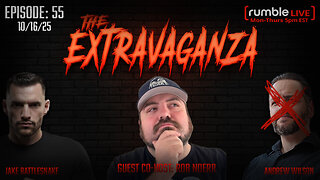Premium Only Content

Episode 3252: Be what you see, and receive what you are
www.catholic-reboot.com
Nightly Zoom Coordinates for Rosary:
Meeting ID: 865 8978 0399
Passcode: Wjjv4960!
Speak Lord for your Servant is Listening
Book Recommendation of the Day
I usually refer to books but you should also have a binder with separation tabs for great encyclicals and sermons by the saints.
St. Augustine – Sermon 272 on the Eucharist
Be What You See in the Holy Eucharist
The major question for us Catholics today is:
Why Catholics Struggle to Believe
In our modern age, one of the greatest tragedies is that the average Catholic no longer truly believes that at Holy Communion they receive is the actual Body, Blood, Soul, and Divinity of Our Lord Jesus Christ.
Now let that sink in as I give you some extensive research to confirm this.
Pew 2019 survey
• Only about 31% of U.S. self-identified Catholics said they believe that “during Catholic Mass, the bread and wine actually become the body and blood of Jesus Christ” (i.e. the doctrine of transubstantiation)
• The majority (69%) said instead that “the bread and wine … are symbols of the body and blood of Jesus Christ.
• Among Catholics who attend Mass weekly (the more observant / “practicing” subset), belief in transubstantiation is higher: about 63% accept Church teaching.
• But even among weekly attenders, about 37% do not believe the bread and wine become body and blood. Within that 37%, Pew breaks it into:
• 23% don’t even know the church’s teaching on the Eucharist, and
• 14% know the teaching but reject it.
More recent / alternative surveys
One challenge is that more recent studies suggest higher belief in the Real Presence when questions are phrased differently:
• The CARA / Georgetown / McGrath Institute survey (2022) finds that 64% of adult Catholics provide responses indicating belief in the Real Presence, when combining multiple questions and more careful wording.
• That same CARA study reports very high rates of Real Presence belief among more regular Mass attenders: 95% of weekly Mass attenders and 80% of those attending monthly or more believe in the Real Presence.
• Meanwhile, Vinea Research (2022) reports that among “Mass-going Catholics” (i.e. those who attend), 69% believe in the Real Presence.
These alternative surveys suggest that some portion of those who “reject” or “don’t believe” in the Real Presence in Pew’s 2019 phrasing may reflect confusion, poor phrasing of the question, or lack of doctrinal knowledge more than outright doctrinal rejection.
So what does this all mean? The bigger question is what created this loss of faith and why? Especially the loss of belief in transubstantiation. This is the kahuna of the Catholic faith In the hymn Adoro Te Devote, Aquinas admits the mystery surpasses human reason:
“Sight, touch, taste in Thee are each deceived; the ear alone most safely is believed.”
In other words, to reject Christ’s words “This is My Body” is to contradict Christ Himself.
But this is the state of the church we live in and this is further proven by the casual reception, irreverence, chatter in the pews, and even priests who speak of the Eucharist more as symbol than as Sacrament.
But why is this so difficult for Catholics to believe, especially when the Church has documented countless Eucharistic miracles across the centuries hosts that have bled, flesh that has been tested and found to be heart tissue, and miraculous preservations that science cannot explain? Why, with such overwhelming evidence, does disbelief prevail?
The answer lies in the spirit of our age. We live in a culture that prizes what can be measured, seen, and tested, while distrusting mystery, authority, and faith. Modern man believes in the microscope and the laboratory, but not in the word of Christ who said: “This is My Body… This is My Blood.” The modern Catholic has been taught to reduce religion to a feeling, a symbol, or a community experience. He has been starved of catechesis and robbed of reverence.
And so, when he kneels at the altar rail if indeed there even is one he may see only bread and wine. He struggles to believe because his heart has been trained to doubt what cannot be proven in a textbook. He struggles because the sacred has been stripped away from his parish life: no silence, no incense, no kneeling, no awe. In such a setting, is it any wonder that belief in the Real Presence has withered?
This is why St. Augustine’s words in Sermon 272 speak with such force to our time. He reminds us that faith must go beyond sight. He exhorts us to believe not what our eyes report, but what Christ has revealed. To deny the Real Presence is to deny the word of God Himself. To accept it is to live a life transformed.
We are diving into one of the greatest treasures left to us by the Church Fathers: Sermon 272 by St. Augustine.
In just a few short lines, St. Augustine captures the heart of the Catholic faith: the Real Presence of Jesus Christ in the Eucharist and the call for us to live as members of His Body.
St. Augustine – Sermon 272 on the Eucharist
"What you see on God’s altar, you’ve already observed during the night. But what it was, what it meant, and how great a thing it is, you have not yet heard. What you see is the bread and the chalice; that’s what your eyes report to you. But your faith obliges you to accept that the bread is the Body of Christ, the chalice the Blood of Christ.
This has been said many times. But it is well to remind you of it.
The bread is the Body of Christ, the chalice is the Blood of Christ.
Briefly, let us say: you receive the Body of Christ, you become the Body of Christ. Do not, then, become a member of Christ and remain idle.
Consider the bread: it is not made from a single grain, but from many. When you were exorcised, you were ground. When you were baptized, you were moistened. When you received the fire of the Holy Spirit, you were baked.
Be what you see, and receive what you are.
The Apostle says, ‘We, being many, are one bread, one body.’ This is the Sacrament of unity, the bond of charity. Whoever receives the Sacrament of unity and does not hold fast to the bond of peace does not receive it to his benefit but as a witness against himself.’”
This sermon speaks to us with urgency. In an age when reverence for the Eucharist has declined, when sacrilegious communions are common, and when many Catholics doubt the Real Presence, Augustine’s words are not simply historical they are prophetic.
Today we’ll break this sermon down into four main themes:
1. Faith beyond sight.
2. Transformation through the sacraments.
3. Unity in the Body of Christ.
4. The warning against unworthy communion.
We’ll also draw from Scripture and the writings of other saints to deepen our understanding. And finally, we’ll pray for a renewal of Eucharistic faith and reverence in our own lives and in the Church.
Faith Beyond Sight
St. Augustine begins bluntly: “What you see is bread and a chalice. But your faith obliges you to accept that the bread is the Body of Christ, the chalice the Blood of Christ.”
Here, Augustine is echoing the words of Christ Himself: “This is My Body… This is My Blood” (Matthew 26:26–28). Our senses fail us; only faith, founded on Christ’s word, reveals the truth.
St. Thomas Aquinas would later enshrine this in his hymn for Corpus Christi: “Sight, touch, and taste in Thee are each deceived; the ear alone most safely is believed.” Faith comes by hearing, not by sight (Romans 10:17).
Think of the disciples at Emmaus: they did not recognize Christ until He broke bread (Luke 24:30–31). Augustine wants us to realize that faith in the Eucharist is the same: Christ is present, though hidden.
Reflection: How often do we approach the Eucharist casually, as if it were only a ritual? Augustine would say: train your eyes of faith to see the reality your physical eyes cannot.
Transformation Through the Sacraments
Augustine gives one of the most beautiful analogies in patristic preaching: the making of bread.
• Ground as grain: At conversion, we are crushed, humbled, stripped of pride. Like wheat ground in the mill, the Christian must be broken of self.
• Moistened with water: Baptism unites us to Christ. The water makes us part of the dough, pliable and ready for God’s shaping.
• Baked by fire: Confirmation seals us with the fire of the Holy Spirit, strengthening us for the Christian life.
This sacramental imagery shows that the Eucharist doesn’t stand alone. It crowns the Christian journey. The faithful must be prepared, purified, and strengthened before approaching the altar.
The saints echo this:
• St. Ignatius of Antioch called the Eucharist “the medicine of immortality.”
• St. John Vianney reminded us: “If we really understood the Mass, we would die of joy.”
❖ Reflection: Do we see our sacramental life as preparation for Communion? Or do we treat Baptism, Confession, and Confirmation as distant memories, instead of living realities leading us to the altar?
Segment 3: Unity in the Body of Christ
Augustine continues: “We, being many, are one bread, one body.”
He draws from 1 Corinthians 10:17: “Because the bread is one, we though many are one body, all of us who partake of the one bread.” The Eucharist is the sacrament of unity not of vague community, but of supernatural communion in Christ.
This unity is not optional. The Mystical Body of Christ must be united in truth, charity, and fidelity to the Church.
For Traditional Catholics, this means guarding against false unity. A unity that ignores doctrine, permits heresy, or embraces sin is not unity in Christ. Augustine warns: to receive the Body of Christ while refusing unity with His truth is to lie with our lips.
St. Pius X, the Pope of the Eucharist, insisted that Communion should draw the faithful into deeper obedience, not complacency. The Eucharist unites us only if we believe and live as Catholics.
Reflection: Do we see the Eucharist as a call to live out true Catholic unity fidelity to doctrine, charity toward others, and loyalty to Christ the King?
A Sobering Warning
Finally, Augustine offers a stark warning: “Whoever receives the Sacrament of unity and does not hold fast to the bond of peace receives it not to his benefit but as a witness against himself.”
This echoes St. Paul: “He who eats and drinks unworthily eats and drinks judgment to himself, not discerning the Body of the Lord” (1 Corinthians 11:29).
The Eucharist is not magic. It is life for those who receive worthily, but condemnation for those who receive in mortal sin, in disbelief, or in rebellion against the Church.
How often do we see public figures who openly defy Catholic teaching approach the altar? How often do we see casual, irreverent reception of Communion? Augustine’s words remind us that such practices bring condemnation, not grace.
The traditional discipline of confession, fasting, kneeling, and receiving on the tongue these are not old customs, but safeguards to protect souls from unworthy communion.
❖ Reflection: Do we prepare ourselves by frequent Confession, prayer, and fasting before receiving Our Lord? Do we understand the gravity of what we receive?
Living Augustine’s Call
St. Augustine sums it up in one unforgettable phrase: “Be what you see, and receive what you are.”
When we look upon the Sacred Host, we see Christ’s Body. When we receive Him, we are called to become His Body, alive in the world. This is not poetry it is a command.
• To receive the Eucharist and then live in sin is hypocrisy.
• To receive Christ and remain idle in charity is negligence.
• But to receive and then live as Christ’s Body in the world bringing His light, truth, and charity into every corner of our lives is true communion.
This is the Eucharistic life to which Traditional Catholics are called. Not empty ritual, but transformation. Not compromise, but fidelity.
❖ Reflection: Do we live as Christ’s Body during the week, or do we leave Him behind at the altar?
Epistle – 1 Peter 5:1–4, 10–11
"Feed the flock of God which is among you, taking care of it, not by constraint, but willingly, according to God: not for filthy lucre’s sake, but voluntarily: neither as lording it over the clergy, but being made a pattern of the flock from the heart. And when the prince of pastors shall appear, you shall receive a never fading crown of glory."
Reflection on the Epistle
St. Peter, himself the first Pope, speaks directly to those entrusted with shepherding the Church. Pastors must serve willingly, not for personal gain, and must be examples of holiness to the flock. This is a call to sacrificial leadership, rooted in humility and fidelity.
St. Callistus lived this Epistle. Once a slave and even imprisoned for the Faith, he understood suffering and service firsthand. As Pope, he emphasized reconciliation and mercy, upholding the truth that Christ’s Church is a refuge for sinners who repent. For this, he was criticized by some rigorists who demanded harsher discipline, but his pastoral charity reflected the heart of the Good Shepherd.
For us, this passage challenges us to examine how we lead whether in our families, communities, or parishes. Do we lead by domination, or by example? Do we seek recognition, or the salvation of souls? True authority is exercised as service, and its reward is not earthly praise but a “never fading crown of glory.”
Gospel – Matthew 16:13–19
"And Jesus said to them: But whom do you say that I am? Simon Peter answering said: Thou art Christ, the Son of the living God. And Jesus answering said to him: Blessed art thou, Simon Bar-Jona: because flesh and blood hath not revealed it to thee, but my Father who is in heaven. And I say to thee: That thou art Peter; and upon this rock I will build my Church, and the gates of hell shall not prevail against it. And I will give to thee the keys of the kingdom of heaven."
Reflection on the Gospel
Here we encounter the foundation of the papacy. Christ does not build His Church on human opinion but on the divine revelation given to Peter: that Jesus is the Christ, the Son of the living God. By declaring Peter the Rock and giving him the keys, Christ ensures that His Church will endure until the end of time.
St. Callistus, as Pope, bore this responsibility. He exercised the power of the keys in granting reconciliation to sinners and guiding the flock during times of persecution. His papacy shows both the authority and the cross of Peter: authority rooted in Christ’s promise, and suffering endured for the sake of fidelity. Ultimately, Callistus sealed his witness with martyrdom, a testimony that the gates of hell will not prevail against the Church.
This Gospel calls us to trust in Christ’s promise to His Church. Though scandals, confusion, and persecutions arise, the Church is built not on human strength but on divine foundation. The papacy remains a rock because it is established by Christ Himself.
Feast of St. Callistus
St. Callistus (d. 222) was born a slave, converted to the Faith, and eventually rose to become the Pope. He is remembered for his defense of the Faith against heresy, for his insistence on mercy for repentant sinners, and for his pastoral courage. He was martyred for Christ under Emperor Alexander Severus. His life proves that the Church is a home for sinners who seek mercy and a fortress against the powers of the world.
Application for Today
• Shepherd with humility: Whether as a father, mother, priest, or teacher, lead with example, not domination.
• Trust in Christ’s promise: The Church may face storms, but the Rock of Peter endures.
• Practice mercy and truth together: Like St. Callistus, hold fast to doctrine while extending mercy to the repentant.
• Embrace sacrifice: Authority in the Church, as in families, is tied to the cross service, suffering, and love.
Conclusionary Prayer
O God, who didst raise up St. Callistus from humble origins to the dignity of Pope and who didst strengthen him to shed his blood for the Faith, grant that, through his intercession, we may be steadfast in fidelity to Thy Church, merciful to the repentant, and courageous in the face of trials.
St. Callistus, Pope and Martyr, pray for us.
Sacred Heart of Jesus, have mercy on us.
Immaculate Heart of Mary, intercede for us.
-
 LIVE
LIVE
SpartakusLIVE
12 minutes agoNEW Mode - ZOMBIES || LAST Stream from CREATOR HOUSE
51 watching -
 LIVE
LIVE
a12cat34dog
29 minutes agoTRIPPIN' INTO THE UNKNOWN :: The Evil Within 2 :: SPOOKTOBER CONTINUES {18+}
51 watching -
 39:25
39:25
Donald Trump Jr.
2 hours agoFBI's Incredible Crime Crackdown, Plus my Message to ABC!! | TRIGGERED Ep.283
76.9K76 -
 LIVE
LIVE
OhHiMark1776
3 hours ago🟠 10-16-25 ||||| Act 3 Continue ||||| Baldur's Gate 3 (2023)
27 watching -
 LIVE
LIVE
The Rabble Wrangler
18 hours agoBattlefield 6 with The Best in the West
62 watching -
 1:02:05
1:02:05
BonginoReport
3 hours agoMusic Stars Go Viral For Anti-ICE Rants - Nightly Scroll w/ Hayley Caronia (Ep.157)
29.7K24 -
 LIVE
LIVE
NostalgiaMicrodosing
2 hours agoLIVE - Digital Déjà Vu
123 watching -
 LIVE
LIVE
GritsGG
6 hours agoRANKED GRIND! Most Wins in WORLD! 3734+!
28 watching -
 1:05:06
1:05:06
TheCrucible
3 hours agoThe Extravaganza! EP: 55 with guest co-host Rob Noerr (10/16/25)
82K4 -
 1:24:30
1:24:30
Kim Iversen
3 hours agoSpotify Bans Nick Fuentes — But the Shift Can’t Be Stopped
31K54